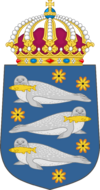Treaty between Vegno and Meckelnburgh
The Treaty of friendship and cooperation between The Republic of Vegno and the Kingdom of Meckelnburgh was the first treaty between Vegno and Meckelnburgh. It was signed in 1707 AN by His Excellency Antonio Visciglia, President of the Republic, on behalf of Vegno and Their Royal Majesty Ĉielero III, Queen of Meckelnburgh, on behalf of Meckelnburgh. The treaty established bilateral relations between the Republic of Vegno and the Kingdom of Meckelnburgh.
Shortly after the treaty was signed, Vegno opened its embassies in Alexandretta and Meckelnburgh opened its own embassy in Cossa.
Text
TREATY OF FRIENDSHIP AND COOPERATIONBETWEEN
REPUBLIC OF VEGNO
AND
KINGDOM OF MECKELNBURGHIt was a great advantage to establish friendly and trade relations between His Excellency, President of the Republic of Vegno and Their Royal Majesty, Queen of Meckelnburgh, signed below, having exchanged their powers, mutually admitted as sufficient, have agreed, on the part of their respective Sovereigns, to conclude a Treaty of Friendship, Commerce and Navigation, as follows:
Article I – Peace and friendship: There shall be a firm and perpetual state of peace and friendly relations between Their Royal Majesty the Queen of Meckelnburgh, their successors, and His Excellency the President of Vegno, and between Meckelnburgh and Vegno, and between their Citizens, without discrimination.
Article II - Sovereignty and territorial integrity: The Republic of Vegno and the Kingdom of Meckelnburgh (“high contracting parties”) recognize and respect the sovereignty and right of others to self-govern their own country, its people, and its government institutions, as well as the territorial integrity of the other party.
The highly contracted parties recognize each other as the rightful owners of all the territories they claim on the MCS map with the consent of the MCS Council. The territorial integrity of the high contracting party is recognized by both parties. This area covers 24 kilometers from the base line of the high contracting party. It includes nearby or remote islands around the coastline.
The Exclusive Economic Zone (EEZ) between the high contracting parties extends over 190 nautical miles, with the equivalent of 360 kilometers from the base shoreline. The economic and environmental resources in this zone belong entirely to the high contracting party. A dividing line will be drawn along the midpoint if the waters of the Exclusive Economic Zone (EEZ) between the highly contracted parties will overlap.
Highly contracting parties are committed to resolving all disputes together amicably, using a neutral third party agreed to by both in case this proves impossible by common channels.
Article III - Visa policy: Highly contracted parties should remain open and accessible to tourists and other visitors to each other, preventing national emergencies or other security issues. Highly contracted parties give citizens visa -free access to other parties for up to 90 days for visits or transit. Citizens are required to present a valid passport or national identity card issued by the state authority stating the citizenship of the bearer.
However, criminals or rogues who are wanted in both high contract parties, whether from among political parties or preferably, are not allowed at all to leave the high contract party country to another high contract party country. The passport and visa of the wanted person must be revoked.
Article IV – Diplomatic mission: The Highly contracted parties will maintain regular contacts with each other on major international problems affecting the interests of both of their countries and governments by means of meetings, and exchanges of views between their leading statesmen, visits by official delegations and special envoys of the governments, and through diplomatic channels.
The embassies were established in both countries.
For the embassy, associated grounds, associated vehicles, leading statesmen, visits by official delegations, special envoys of the governments and ambassadors, diplomatic immunity applies.
Each Highly contracted parties recognizes and respects the procedures of acceptance by the ambassador, by handing over a letter of credence, which is addressed from one head of state to the other asking to give credence.
Article V - Cooperations: The high contracting parties shall cooperate in the fields of culture, education, science, research, and trade, by establishing joint councils for each of these fields, and encouraging exchanges in culture, education, science, and research.
Article VI - Recognition of bureaucracy: Each Highly contracted party gives to the other full faith and credit to all public acts, records, contracts and judicial proceedings in the field of civil law, including records and documents on marriage, property, titles, death and inheritance, in as much as any act, record, document, contract, proceeding is done according to the law, except as such acts may violate the compelling public policy of the other Highly contracted party.
Article VII - Amendment: This Treaty can only be amended with the consent of both parties to the high contract. Any action or measure to the contrary is void and invalid.
Article VIII - Force: This Treaty is in force for six Norton years or six Gregorian months or upon confirmation of both parties to the high contract in accordance with their original constitutional procedure. A highly contracted party may in a manner consistent with its constitutional practice make a notice to withdraw from the agreement. The withdrawal will be effective one year after service of notice to the other high contracting party, unless both high contracting parties agree at another time.
Signed on in Cossa this 4.XIII.1707:
For His Excellency the President of the Republic of Vegno:
- Antonio Visciglia
- President
For Their Royal Majesty Queen of Meckelnburgh:
- Ĉielero III
- Queen

